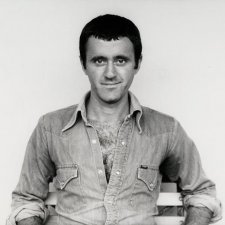Temporary road closures will be in place around the Gallery from 26 February during the Enlighten Festival.
Gillian Armstrong AM (b. 1950), film director, was born in Melbourne and studied theatre and film at Swinburne Technical College and then at the Australian Film and Television School in the early 1970s. After directing and writing several shorts and documentaries, she released a full-length 16mm film, The Singer and the Dancer, which she also co-produced and which won best narrative film at the 1976 Sydney Film Festival. The same year, she made Smokes and Lollies, the first instalment of what became a series of documentaries chronicling the lives of a group of three Australian women. In 1979, Armstrong directed her first feature, the critically- acclaimed adaptation of Miles Franklin’s My Brilliant Career. Produced by Margaret Fink and starring Judy Davis, the film won seven Australian Film Institute (AFI) awards, including Best Picture, and was nominated for an Academy Award. Having directed the musical Starstruck (1982) and a number of rock videos, Armstrong made her first American film, Mrs Soffel (1984) featuring Mel Gibson and Diane Keaton. After making further films in Australia, including the AFI award-winning High Tide (1987) and The Last Days of Chez Nous (1992), she returned to the USA to make Little Women (1995). Armstrong’s subsequent films include Oscar and Lucinda (1997) and Charlotte Gray (2001), both featuring Cate Blanchett; and Death Defying Acts (2007). Thrice-winner (in 1979, 1987 and 1992) of the AFI award for Best Director, Armstrong was awarded the Grand Jury Prize at the 2006 Sundance Film Festival for Unfolding Florence, a film about wallpaper designer, Florence Broadhurst. In 2010, Armstrong won the Australian Director’s Guild Award for Love, Lust and Lies, the fifth film in the series that started with Smokes and Lollies in 1976.
Stuart Campbell (1951–2009) studied at NIDA and during the 1970s and 1980s had some success as an actor in theatre, television and film. His friends from this sphere became his subjects when, from the early 1980s, he became increasingly involved in his work as a portrait photographer. Gillian Armstrong recalls, ‘Stuart had a great ability to relax people, so they could forget about the camera’, resluting in portraits of great sensitivity.
Collection: National Portrait Gallery
Gift of the Estate of Stuart Campbell 2012
© Estate of Stuart Campbell



On one level The Companion talks about the most famous and frontline Australians, but on another it tells us about ourselves.



Lee Tulloch remembers her great friend NIDA-trained actor turned photographer Stuart Campbell.



The late Australian photographer Stuart Campbell produced superb photographs of Australian actors of stage and screen.